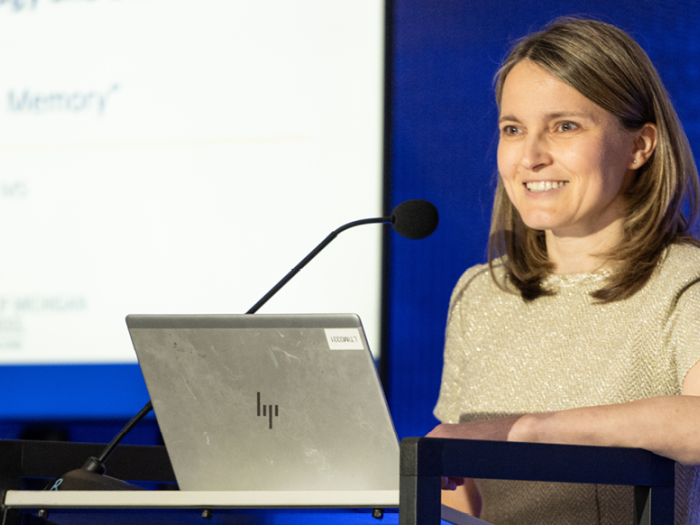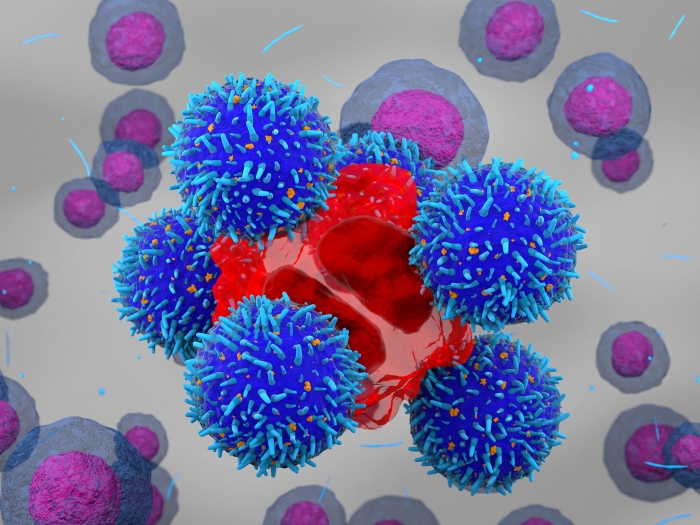Four DCMB alumni shared their experience building their career.
While an ice storm threatened South-East Michigan, DCMB quickly pivoted to a hybrid hosting of its annual “Industry Day,” Wednesday, February 22. Four alumni presented their professional trajectory and current roles to an in-person and remote audience of M.S. and Ph.D. students.
Alumni speakers:
- Ashley Carroll (M.S. ’22), Bioinformatics Scientist II at Illumina, Inc.
- Joshua Drews (M.S. ’18), Computational Biologist – RNA at Tempus Labs, Inc.
- Jeremy Kaplan (M.S. ’20), Bioinformatics Scientist at Haystack Oncology
- Mark Kiel (M.D., Ph.D., ’00), Co-Founder and CSO, Genomenon
It is very valuable to our current students to have the opportunity to ask their older peers for insights into the professional world they aspire to join. We are very grateful to our alumni for their generous comments and guidance.
“I liked the opportunity to meet and connect with industry professionals and their genuine enthusiasm toward us. The panelists really engaged with us and gave great advice.
It was really insightful to hear about their becomings and their company's hiring processes. I, personally, learned a lot from hearing first-hand experiences from a recent U of M graduate.”
—Student’s comments about Industry Day.
This event was organized by DCMB faculty and staff Alla Karnovsky, Stephen Guest, Cristina Mitrea, Julia Eussen and Aaron Bookvich.
READ THE RECOMMENDATIONS BELOW
Q- Recommendations and experience with interviews
- Preparation is key.
- Employees want to understand how you think --more than learn about all your skills and knowledge.
- It’s important to show technical as well as soft skills. Employers seek well-rounded candidates who can integrate teams and mesh with colleagues.
- Take interviews as a learning moment, knowing that there will be many more interviews.
- Although practicing in the mirror can feel weird, it helps prepare you so that when you’re in the situation you don’t ramble on.
- Your hiring interviewers are not experts in your field. Make sure that you talk about your science in an easy-to-understand manner, giving simple examples and visuals.
- Prepare for an elevator pitch introduction.
- There are different styles of interviewers –prepare for different styles: there are more traditional questions, for example, “Tell me about your biggest failure;” “How did you grow in your role,” and more relaxed ones, aiming at finding out if you’re personable.
- Get feedback on your presentation from friends and colleagues.
- If you reflect poorly on your own, it’s going to show to your potential employer.
- Make sure you answer the question that was asked.Do not ramble.
- Understand the motivation behind the question -- “Why are they asking that question?”
- Why are they hiring? Technical is necessary, but why/how are you going to contribute to the dept.? Show that you’re someone who is going to grow.
- Want to make sure that you can learn something new, and that you’re EXCITED by it! Employers want the one who is the most energetic, some enthusiasm.
Q - Does an internship prepare you better for your job search than a research experience in the lab?
- An internship is a foot in the door. It allows you to get a feel for the company, if you like it and they like you, it’s a great way to get a job.
- There is a lot of competition to get into a “big name” company, but starting off with a small health system group (e.g. Sparrow) gives a lot of autonomy while receiving guidance as well. It’s good to develop more soft skills first, and then to go on to doing more software engineering in a faster pace environment. The skills acquired in a smaller company transfer to a larger one.
- While in school, make the best of the slower summer months.
- Attend as many career fairs as you can (e.g. College of Engineering, LSA).
Q - How do you present yourself when it’s your first job at a company?
- When joining a company, you want to show your willingness to see beyond the task assigned. Your eagerness will set you apart from a maturity experience that you don’t have yet. For example, when you talk about your own studies, emphasize how you looked beyond your own project. Recognize problems and trends, collaborate with supervisor and colleagues to expand. Do not just cultivate your technical skills; recognize how teams and companies work together and look for ways to be more effective. Identify problems and solve them.
- You don’t want to over promise, you don’t want to exaggerate nor lie about your capabilities. Remember, no one knows everything about what’s going on!
- Instead, show how you take from your background and apply this to other problems. Go in with an attitude of wanting to grow and learn.
- Focus on your strength and don’t get caught up in your weaknesses.
- Make sure your resume is accurate. Have your own resume copy, with detailed points about what you did in that job, so you have more info to fall back on.
- Connect an unrelated experience and show how you drew lessons that could be applied to other areas.
Q - What are the benefits of a Ph.D. degree over an M.S. degree?
- With a Ph.D., ask yourself, is this how I want to spend the next 5 years of my life? Don’t worry so much about your career. I love my Ph.D. Do it if you love it!
- On the job market: with an M.S., you start at a lower level, and it can be harder to get into R&D. But once you’re in the job, the only thing that matters is the quality of your work ---rather than your degree.
- For a wet lab position, you might need a Ph.D., but once you’ve demonstrated your value, the M.S. should be OK.
- An M.D.-Ph.D. degree takes about 10 years, and you lose out on money potential. It is not guaranteed that it’s going to pay dividend. Make sure that you love it!! You can demonstrate ability without degree, especially with cutting-edge tools that are outmoded in only a few years. A Ph.D. in bioinformatics is not the only degree to consider either – you might want to expand your credentials and capabilities acquired with your M.S. in bioinformatics, for example with getting an MBA.
- Looking at the career ladder, after an M.S., the next position is a Ph.D. one. Potentially, one could reach the same Ph.D. role within the amount of time it takes to get a Ph.D.
- As a Ph.D. student you get very specialized. On the job market, you need to make parallels with what you have learned and how it might be applicable to other areas. Magnify what you were able to do for yourself and the field, rather than focusing on “the fruit fly you teased.” It is even better if you can make what you learned resonate with that specific job or something the company is doing.
Q - Job in a different field from bioinformatics: If I take a position in the automotive industry, is it possible to go back into informatics?
- Show that you can think of a problem differently, using the skills you gained from another field,
- It’s more about the skills you get from this different experience than being in a different area of application.
Q - How does one find an internship?
- Networking is helpful.
- Look into U-M resources - Ask around for a repository of these resources, look for the conduits.
- Apply to a lot of things, with a high attrition rate. Just keep at it.
- Attend many career fairs (LSA, CoE). Talk to people at booths where not a lot of people are going.
Q - In a company, it’s about the team. How can we prepare students to be team players?
- Look for opportunities to leverage tools for collaboration.
- Be able to communicate your great idea because it does not matter if it’s not heard and taken back.
- Communicate your idea in a way that everyone can understand.
- Balance of individual and collaborative work. Proof of concept work is more individual and then you need to be able to articulate it to others. You might want to create bridges over teams.
- A course that requires a big project is a good opportunity for a broad collaborative project experience. You have teammates, even if and when you work on your own part.
- Get opportunities to practice giving and receiving feedback. This is an important soft skill.
- While there are mechanisms to hold people accountable, people are emotional, at all levels of an organization. Knowing how to navigate the human emotions is an important skill. It helps people grow emotionally by working together more often.
Associate Professor

Lecturer

Lecturer





